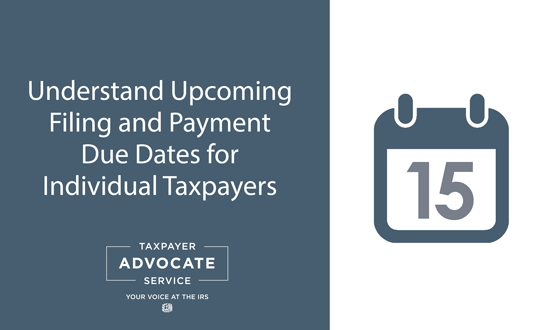
Most federal tax return filing and payment deadlines are postponed from April 15 to July 15, 2020. These postponements are automatic and apply to all taxpayers. You do not need to file any additional forms or call the IRS to qualify, unless you need an extension to file beyond the July 15. To help individual taxpayers better understand exactly what this all means, for the Form 1040 filers, we break it down for you below.
Tax Return Due Date for 2019
Individual tax returns were originally due on April 15, 2020. That filing date was postponed to July 15, 2020, due to the COVID-19 emergency. Thus taxpayers need to file the 2019 Form 1040 by July 15, 2020.
See the IRS’s File page or our Options for Filing a Tax Return page for filing options, but it is recommended that you file electronically whenever possible.
Extension of Time to File
If you are unable to file by July 15, 2020, you can request a filing extension and submit it by July 15, 2020. This can be done electronically, which is recommended, or by mailing Form 4868, Application for Automatic Extension of Time To File U.S. Individual Income Tax Return (PDF).
You can pay income taxes (including estimated taxes) using Direct Pay, the Electronic Federal Tax Payment System (EFTPS), or a credit or debit card. If you use one of these methods you will get an automatic extension of time to file by selecting “extension” as the reason for the payment. There is no need to separately file a Form 4868. You will receive a confirmation number after submitting payment. If you are paying with Direct Pay and EFTPS, you can sign up for email notifications.
If the extension request is timely and accepted, that means you will then have until October 15, 2020 to file.
Note: The extension of time to file only gives you additional time to file, it does not give you additional time to pay beyond July 15, 2020. If you do not pay your taxes on of before July 15, you will be subject to interest and penalties from July 16 until the date of payment. See below for more information about paying taxes if you are unable to pay in full.
Paying Taxes Due on the Return
Any taxes shown on the 2019 Form 1040, must be paid on or before July 15, 2020.
If you cannot pay in full by that date, you can review the available payment options and make the request to the IRS. To find the options, you can visit our I Can’t Pay My Taxes Get Help page or IRS’s Paying Your Taxes page or see how you can Schedule and electronically pay federal taxes due by July 15.
Unclaimed Tax Year 2016 Refunds
For 2016 tax returns, the normal April 15 deadline to claim a refund has also been extended to July 15, 2020. If you believe you are entitled to receive a 2016 refund, the 2016 Form 1040 must be properly addressed and postmarked by July 15, 2020.
Estimated Tax Payments for the 2020 Tax Return
The quarterly estimated tax payment due dates for both the April 15 and the June 15 payments were postponed to July, 15, 2020, without penalty. Watch for more guidance from the IRS about this topic, if you are unable to pay by July 15.
More Information
You can find more detailed information by visiting; our Coronavirus (COVID-19) Tax Relief page, the IRS’s Coronavirus Tax Relief: Filing and Payment Deadlines page or in the IRS’s Filing and Payment Deadlines Questions and Answers. The IRS website also has tax information in: Spanish (Español); Chinese (中文); Korean (한국어); Russian (Pусский); Vietnamese (Tiếng Việt); and Haitian Creole (Kreyòl ayisyen).
Taxpayer Advocate Service Help
Currently, the Taxpayer Advocate Service (TAS) is open to virtually serve taxpayers who find themselves in hardship situations or dealing with IRS tax problems they’ve been unable to resolve directly with the IRS. Visit our Contact Us page to see who qualifies for TAS assistance. We will also be posting updated operational status information there as well.
Follow the Taxpayer Advocate Service across social media: Twitter, Facebook, LinkedIn and YouTube.
Source: taxpayeradvocate.irs.gov

Leave a Reply